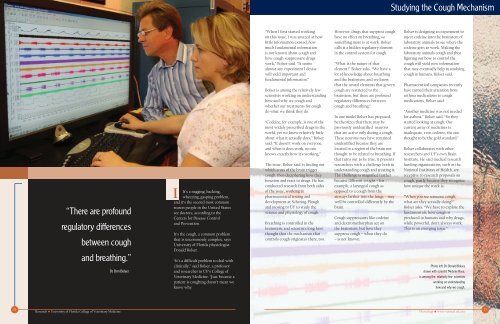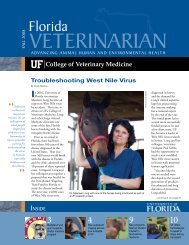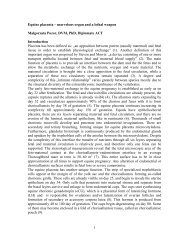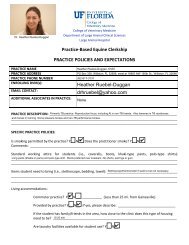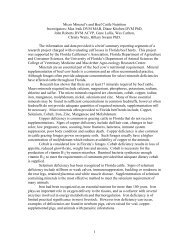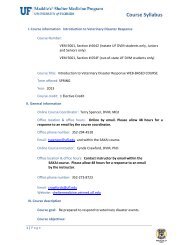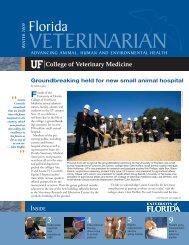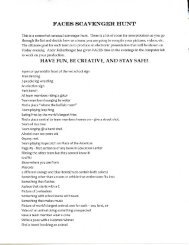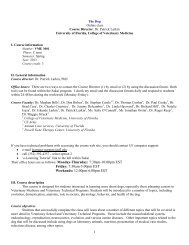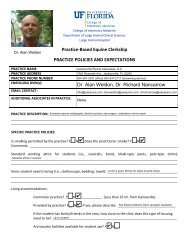Advancing Animal Reproductive HealthAAdvances in animalreproductive health havemirrored advances in humanreproductive health. Horses, forexample, get in vitro fertilizationand have ultrasound examinations<strong>of</strong> unborn babies, just like people do.While horse owners come to theUniversity <strong>of</strong> Florida’s ReproductionService in the <strong>College</strong> <strong>of</strong> <strong>Veterinary</strong><strong>Medicine</strong> for such procedures, someare now <strong>of</strong>fered by veterinarianscloser to home. Where does thatleave UF’s Reproduction Service?Poised to take the next step intothe future, says service chiefMats Troedsson.UF has done its job when itpopularizes health care technologyfor animals, Troedsson said. Thepoint <strong>of</strong> developing new treatmentsis to get the advances into the hands<strong>of</strong> veterinarians.“People don’t need to come here forultrasound anymore,” Troedssonsaid, although they can, if they like.“So we will develop new assistedreproduction technologies.“And when those technologies arerefined enough to go into the field,we will be one step ahead, workingon the next technology.”Troedsson came to UF in 2002,attracted by the synergy betweenthe college’s clinical and researchfacilities. Being able to treat equinepatients and conduct research intotheir reproductive health issues, too,was a key for him. He is one <strong>of</strong> fiveveterinarian-researchers, threeworking on equine reproductiveissues and two on small animalreproductive issues. The staff isinternational: Troedsson grew upin Sweden, and recentlyresearchers from Poland andBelgium have joined the staff.“UF is one <strong>of</strong> the main veterinarycolleges when it comes to bothequine research and clinics,”Troedsson said. “The proximity <strong>of</strong>the horse-breeding center in Ocalahelps, too.”Troedsson’s research has focusedon equine endometritis, a leadingcause <strong>of</strong> fertility problems inmares. In fact, uterineinflammation affects about 15percent <strong>of</strong> mares, a high rate <strong>of</strong>incidence for any disease.Troedsson started out looking for thepart <strong>of</strong> the uterine defense mechanismthat was breaking down. He foundthat mares susceptible to endometritisdon’t contract the uterus in the sameway non-susceptible mares do.Susceptible mares were responding toan inflammation that caused them t<strong>of</strong>ail reproductively.At first, Troedsson thought bacteriacaused the inflammation. But hefound that sperm cells trigger anormal inflammatory response, too.In a normal mare, semen causesan inflammation that flushes outexcess sperm cells from the uterus.The inflammation is modulated,however, by seminal plasma, ensuringa healthy environment when a fertilizedegg descends into the uterus.In a susceptible mare, the inflammationprocess continued, causing the embryoto be lost. Troedsson currently is tryingto identify proteins in seminal plasmathat protect sperm cells.“We can sort outthe bad genesand savethe good genetics.”The work could lead to bettermanagement <strong>of</strong> mares who aresusceptible to endometritis.Dr. Mats Troedsson“In the past, we believed that seminalplasma was just a vehicle,” Troedssonsaid. “Now we recognize its importance.”Troedsson also is in the early stages <strong>of</strong>research into genetic testing <strong>of</strong> embryosto improve the health <strong>of</strong> future crops<strong>of</strong> horses.Nearly all horse breeds suffer from adisease unique to that breed. Quarterhorses have a debilitating musclecondition. American paint horses sufferfrom a genetic disease that kills foals justdays after their birth. The roots <strong>of</strong> thediseases are genetic, and the key to curingthem may lie in disrupting the geneticlink from generation to generation.Troedsson has started a project to domolecular genetic testing on embryosbefore they are implanted. Theresearch calls for removing single cellsfrom a five- or six-day-old embryoand testing the cells for geneticdiseases. Only healthy, disease-freeembryos would then be implanted inmares, leading to fewer geneticdiseases in future generations.“We can sort out the bad genesand save the good genetics,”Troedsson said. “There are somany diseases. So we have tomake a decision: What can theylive with; what are the genetictraits that are so desired?”Troedsson has collaborated withobstetricians and gynecologists atUF’s <strong>College</strong> <strong>of</strong> <strong>Medicine</strong> andresearchers in the Department <strong>of</strong>Animal Sciences, as well as withveterinary colleagues who studyfertility issues in stallions.Although there are few majorgrants for equine research each year,he says the Reproduction Service hasbeen able to conduct research with arange <strong>of</strong> smaller grants fromorganizations like the AmericanQuarter Horse Association, theGrayson Jockey Club Foundation andinternal funding from the university.“It’s very difficult to get funding inequine research, with only a handful<strong>of</strong> national grants each year,”Troedsson said. “But I likespecializing in equine reproductionbecause it has great potential toapply basic research findings toclinical advances through assistedreproduction. It’s a very resultsorientedscience.”Photo left: Dr. Mats Troedsson’s researchhas focused on equine endometritis,a leading cause <strong>of</strong> fertility problems in mares.22<strong>Research</strong> • University <strong>of</strong> Florida <strong>College</strong> <strong>of</strong> <strong>Veterinary</strong> <strong>Medicine</strong>••Clincal • www.vetmed.ufl.edu23
Studying the Cough Mechanism“There are pr<strong>of</strong>oundregulatory differencesbetween coughand breathing.”Dr. Don BolserIIt’s a nagging, hacking,wheezing, gasping problem,and it’s the second most commonreason people in the United Statessee doctors, according to theCenters for Disease Controland Prevention.It’s the cough, a common problemthat is uncommonly complex, saysUniversity <strong>of</strong> Florida physiologistDonald Bolser.“It’s a difficult problem to deal withclinically,” said Bolser, a pr<strong>of</strong>essorand researcher in UF’s <strong>College</strong> <strong>of</strong><strong>Veterinary</strong> <strong>Medicine</strong>. “Just because apatient is coughing doesn’t mean weknow why.“When I first started workingon this issue, I was amazed at howlittle information existed, howmuch fundamental informationis not known about cough andhow cough-suppressant drugswork,” Bolser said. “It seemsalmost any experiment I devisewill yield important andfundamental information.”Bolser is among the relatively fewscientists working on understandinghow and why we cough andwhether our treatments for coughdo what we think they do.“Codeine, for example, is one <strong>of</strong> themost widely prescribed drugs in theworld, yet we know relatively littleabout what it actually does,” Bolsersaid. “It doesn’t work on everyone,and when it does work, no oneknows exactly how it’s working.”The issue, Bolser said, is finding outwhich areas <strong>of</strong> the brain triggercough, then deciphering how theyfunction and react to drugs. He hasconducted research from both sides<strong>of</strong> the issue, working inpharmaceutical testing anddevelopment at Schering-Ploughand moving to UF to study thescience and physiology <strong>of</strong> cough.Breathing is controlled in thebrainstem, and scientists long havethought that the mechanism thatcontrols cough originates there, too.However, drugs that suppress coughhave no effect on breathing, sosomething more is at work. Bolsercalls it a hidden regulatory elementin the control system for cough.“What is the nature <strong>of</strong> thatelement?” Bolser asks. “We have alot <strong>of</strong> knowledge about breathingand the brainstem, and we knowthat the neural elements that governcough are restricted to thebrainstem, but there are pr<strong>of</strong>oundregulatory differences betweencough and breathing.”In one model Bolser has proposed,he theorizes that there may bepreviously unidentified neuronsthat are active only during a cough.These neurons may have remainedunidentified because they arelocated in a region <strong>of</strong> the brain notthought to be related to breathing. Ifthat turns out to be true, it presentsresearchers with a challenge both inunderstanding cough and treating it.The challenge is magnified furtherbecause different coughs – forexample, a laryngeal cough asopposed to a cough from theairways farther into the lungs – maywell be controlled differently by thebrain.Cough suppressants like codeineand dextromethorphan act onthe brainstem, but how theysuppress cough – when they do– is not known.Bolser is designing an experiment toinject codeine into the brainstem <strong>of</strong>laboratory animals to see where thecodeine goes to work. Making thelaboratory animals cough and thenfiguring out how to control thecough will yield new informationthat may eventually help in studyingcough in humans, Bolser said.Pharmaceutical companies recentlyhave turned their attention fromasthma medications to coughmedications, Bolser said.“Another medicine was not neededfor asthma,” Bolser said. “So theystarted looking at cough. Ourcurrent array <strong>of</strong> medicines isinadequate, even codeine, the onethought to be the gold standard.”Bolser collaborates with otherresearchers and UF’s own BrainInstitute. He said medical researchfunding organizations, such as theNational Institutes <strong>of</strong> Health, arereceptive to research proposals oncough, partly because they recognizehow unique the work is.“When you see someone cough,what are they actually doing?”Bolser asks. “We have to explore thefundamentals, how cough isproduced in humans and why drugs,while powerful, don’t always work.This is an emerging issue.”Photo left: Dr. Donald Bolser,shown with scientist Melanie Rose,is among the relatively few scientistsworking on understandinghow and why we cough.24<strong>Research</strong> • University <strong>of</strong> Florida <strong>College</strong> <strong>of</strong> <strong>Veterinary</strong> <strong>Medicine</strong>••Physiology • www.vetmed.ufl.edu25


